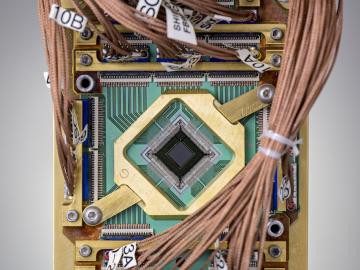
Filter News
Area of Research
- (-) Nuclear Systems Modeling, Simulation and Validation (1)
- (-) Supercomputing (68)
- (-) Transportation Systems (2)
- Advanced Manufacturing (22)
- Biology and Environment (26)
- Building Technologies (1)
- Computational Biology (1)
- Computational Engineering (1)
- Computer Science (8)
- Electricity and Smart Grid (1)
- Energy Science (164)
- Fuel Cycle Science and Technology (1)
- Functional Materials for Energy (1)
- Fusion and Fission (33)
- Fusion Energy (10)
- Isotope Development and Production (1)
- Isotopes (27)
- Materials (124)
- Materials Characterization (1)
- Materials for Computing (20)
- Materials Under Extremes (1)
- National Security (35)
- Neutron Science (41)
- Nuclear Science and Technology (38)
- Quantum information Science (2)
News Topics
- (-) 3-D Printing/Advanced Manufacturing (5)
- (-) Artificial Intelligence (37)
- (-) Cybersecurity (8)
- (-) Isotopes (2)
- (-) Materials Science (17)
- (-) Nuclear Energy (5)
- (-) Transportation (8)
- Advanced Reactors (2)
- Big Data (22)
- Bioenergy (9)
- Biology (11)
- Biomedical (17)
- Biotechnology (2)
- Buildings (4)
- Chemical Sciences (5)
- Computer Science (96)
- Coronavirus (14)
- Critical Materials (3)
- Energy Storage (8)
- Environment (22)
- Exascale Computing (26)
- Frontier (32)
- Fusion (1)
- Grid (5)
- High-Performance Computing (43)
- Machine Learning (15)
- Materials (15)
- Mathematics (2)
- Microscopy (7)
- Molten Salt (1)
- Nanotechnology (11)
- National Security (8)
- Neutron Science (13)
- Partnerships (1)
- Physics (8)
- Polymers (2)
- Quantum Computing (20)
- Quantum Science (25)
- Security (6)
- Simulation (16)
- Software (1)
- Space Exploration (3)
- Summit (43)
Media Contacts

A team of collaborators from ORNL, Google Inc., Snowflake Inc. and Ververica GmbH has tested a computing concept that could help speed up real-time processing of data that stream on mobile and other electronic devices.

A team led by the U.S. Department of Energy’s Oak Ridge National Laboratory demonstrated the viability of a “quantum entanglement witness” capable of proving the presence of entanglement between magnetic particles, or spins, in a quantum material.

Oak Ridge National Laboratory researchers developed and demonstrated algorithm-based controls for a hybrid electric bus that yielded up to 30% energy savings compared with existing controls.

The daily traffic congestion along the streets and interstate lanes of Chattanooga could be headed the way of the horse and buggy with help from ORNL researchers.

An ORNL-led team comprising researchers from multiple DOE national laboratories is using artificial intelligence and computational screening techniques – in combination with experimental validation – to identify and design five promising drug therapy approaches to target the SARS-CoV-2 virus.

At the Department of Energy’s Oak Ridge National Laboratory, scientists use artificial intelligence, or AI, to accelerate the discovery and development of materials for energy and information technologies.

The Department of Energy’s Oak Ridge National Laboratory has licensed its award-winning artificial intelligence software system, the Multinode Evolutionary Neural Networks for Deep Learning, to General Motors for use in vehicle technology and design.

Twenty-seven ORNL researchers Zoomed into 11 middle schools across Tennessee during the annual Engineers Week in February. East Tennessee schools throughout Oak Ridge and Roane, Sevier, Blount and Loudon counties participated, with three West Tennessee schools joining in.

A multi-institutional team became the first to generate accurate results from materials science simulations on a quantum computer that can be verified with neutron scattering experiments and other practical techniques.

In the quest for advanced vehicles with higher energy efficiency and ultra-low emissions, ORNL researchers are accelerating a research engine that gives scientists and engineers an unprecedented view inside the atomic-level workings of combustion engines in real time.


